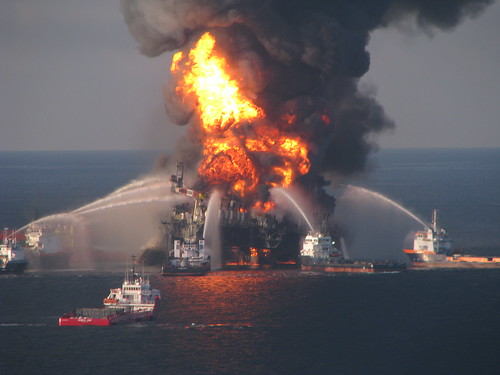
America's Chernobyl
There were 50 deaths directly attributable to the disaster. Nine months after the plume spread out over Europe the incidence of Down's Syndrome increased significantly in human births. The incidence of structural anomalies in human fetuses nervous systems doubled the following year. The incidence of thyroid cancer increased greatly in those exposed to the plume of radionuclides. Four square kilometers of the surrounding forest turned brown and died. Livestock and wildlife that remained after the evacuation of the area died, or suffered thyroid cancer. The town of Chernobyl/Pripyat is now the largest ghost town in Europe, although some of the elderly former residents are moving back to the area contrary to official restrictions. The disaster was a colossal mistake in foresight, planning, engineering, and policy on the part of the Soviets.

Photo courtesy of the US Coast Guard. Source: www.incidentnews.gov/incident/82 20 via SkyTruth
The unfolding disaster in the Gulf of Mexico will likely exceed the environmental costs of the Chernobyl accident. Both disasters are hard for the average person to assess, at least so far. The Chernobyl incident was invisible to those without access to radiation dosimeters, and the Deepwater Horizon disaster remains offshore and it's scope more nebulous in the public mind at present. Both accidents were born of the search for, or generation of energy. The etiology of events and official attitudes leading up to both disasters bear some commonality as well. The officials and engineers responsible for both projects seemed to share a confidence in their own mastery of the technology to an extent at which they succumbed to an uncritical belief that such a disaster was all but impossible. In accordance with those beliefs they chose to under-design the safety features of both the oil rig and the reactor. As is so often the case, the little people pay the most dearly for these errors in planning and policy, (see: Union Carbide at Bhopal, 3000+dead).
We have yet to see what the final cost of the Deepwater Horizon disaster will be. The question that is foremost in my mind is what, if anything, will our policymakers learn from the errors made in licensing and regulating offshore oil exploration? Does the granting of exemption from installing the $500,000 remote acoustic shutoff for a BOP seem like an economically sound policy now that we will be spending years and billions of dollars trying to contain this spill? Does granting a waiver from producing a detailed EIS make sense for offshore drilling? Assuming we continue to risk our continental shelf and shorelines with the exploration for oil,do we think it might be worthwhile to require audits of these facilities to ensure compliance with a set of national standards for construction and operation? Should we re-evaluate a national energy policy that stifles development of alternative energy in favor of powerful traditional energy sources? Should we pay for the entire mess to be cleaned up? (Hint: by trimming Social Security payments and eligibility we should be able to do this!) Or should we hold these corporations economically accountable? (Hint: Yes.) Should the potential loss of tourism, marine wildlife, and marine habitat factor into the instinctual urge of our legislators to tell us to grab our ankles and bend over for whatever industry lobbyist is offering the largest sum for their election campaigns?
tpmcafe.talkingpointsmemo.com/talk/blogs/m/i/miguelitoh2o/2010/05/americas-chernobyl-1.php
